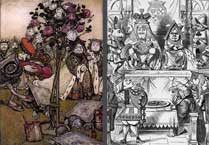Bankiet
“Gentlemen, the king must be forced upon the king; the king must be imprisoned within the king; we must lock up the king in the king...”

Written in Argentina in 1946 at the same time as The Marriage, The Banquet (Bankiet) was first published in April 1953 in Wiadomości, the Polish émigré newspaper in London. Written in Argentina in 1946 at the same time as The Marriage, The Banquet (Bankiet) was first published in April 1953 in Wiadomości, the Polish émigré newspaper in London. Witold Gombrowicz added this story to his new collection Bacacay for its publication in Krakow in 1957.

In a scene reminiscent of a fairy tale, a sumptuous banquet on the occasion of King Gnouillon’s marriage to the Archduchess, Witold Gombrowicz explodes the laws of the genre, slicing open his stereotypical narrative to reveal a grotesque stampede. Rather than illustrating a moral, The Banquet tells how an ugly, greedy prince unmasks the hypocrisy of his court, whose courtesans wish to hide his royal vices and trap him in his social rank. Once again, Witold Gombrowicz twists an ordinary setting and idealized form inside out and back again: In his world, the hidden and the shameful must ultimately destroy the established order and the straitjacket of social norms.

The scene of the royal court banquet also appears in Witold Gombrowicz’s plays Ivona, Princess of Burgundia, The Marriage, and Operetta, where the fairy tale is broken by ironic misappropriation. The banquet is a stylistic exercise of Gombrowicz’s, in which he dismantles the classical workings of story in favor of a new construction, somewhere between the grimace and irony.
Excerpt: The disgrace! The disgrace! The horror! So fanatical in its baseness was the king’s soul, so trivially narrow, that he did not covet larger sums but precisely petty ones; small sums were capable of leading him to the very depths of hell. Oh, the most fundamental monstrousness of this matter was the fact that even bribes did not attract the king so much as tips—tips for him were like sausage to a dog! The entire hall had frozen in mute anticipation. Hearing the familiar, oh-so-sweet sound, King Slothbert put down his goblet and, forgetting everything else, in his boundless foolishness ... licked his lips unobtrusively... . Unobtrusively! That was what he imagined. The king’s lip-licking burst like a bomb in front of the entire banquet, which went red-faced with shame. Archduchess Renata Adelaide let out a muffled cry of disgust! The eyes of the government, the court, the generals, and the clergy turned to the person of the old man who for many years had guided the helm of the state in his toil-worn hands. What was to be done? What course of action was to be taken?





